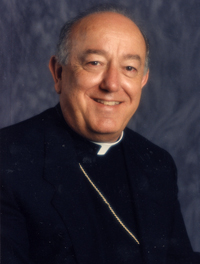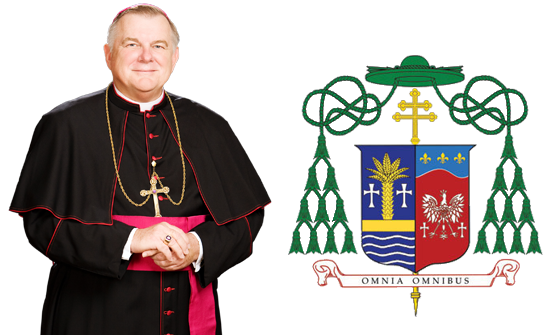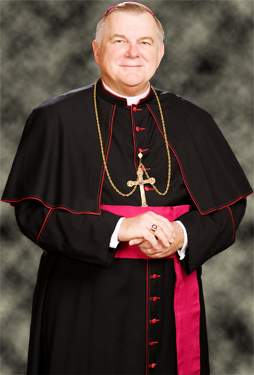
Archbishop Emeritus of Miami John Clement Favalora
- John Clement Favalora was born December 5, 1935 in New Orleans, Louisiana. He studied for the priesthood at St. Joseph Seminary in St. Benedict, Louisiana; Notre Dame Seminary in New Orleans; and the Pontifical Gregorian University in Rome, Italy, where he was ordained on December 20, 1961.
- On November 3, 1994 Bishop John Favalora was appointed to succeed retiring Archbishop Edward A. McCarthy, becoming the third Archbishop of Miami. Archbishop Favalora was installed on December 20, 1994, at St. Mary's Cathedral in Miami.
- Archbishop Favalora has spoken out on behalf of the rights of immigrants, especially Haitians. The Archbishop has and will continue to fight for the rights of Haitians that have arrived on our shorelines to get them Temporary Protective status to stay in our country.
- The Archbishop was chosen in 1997 as a U.S. delegate to the Synod for America. Many of the initiatives now being taken in the Archdiocese, chief among them the emphasis on missionary activity at the parish and school levels, are in keeping with the recommendation of that synod.
- Archbishop Favalora initiated the Vision 2000 endowment in 2000 with the goal of raising $75 million to secure the future of the archdiocese. Vision 2000 raised about $108 million in pledges.
- In the fall of 2006, he promulgated “Fountain of Grace,” a 50-page booklet containing a basic introduction to the teachings of the Catholic Church. The booklet was created at his request, to make sure that anybody engaged in ministry in the archdiocese has a fundamental understanding of the basic tenets of the Catholic faith. “Fountain of Grace” is required reading for anyone seeking to teach, sing, lector, distribute the Eucharist, or engage in any other type of parish service in the Archdiocese of Miami.
- The Archbishop has written four Pastoral letters; his first two coincided with the beginning and the end of the Jubilee Year 2000 and his last two coincided with the beginning and the end of the Archdiocese’s 50th anniversary celebration in 2008. In his last pastoral letter he wrote brief reflections on the events in the life of the Holy Family and some applications to our present day family life.
- The Archbishop has supported both St. John Vianney College Seminary and St. Vincent de Paul Regional Seminary by being a strong role model of priestly formation and by attending Mass with the seminarians. In 2009 St. John Vianney College Seminary in Miami celebrated its golden jubilee with a record number of seminarians enrolled.
Biography
Born:
- December 5, 1935, New Orleans, Louisiana
- Only son of Felix J. Favalora and Leona M. Stevens (both deceased)
Ordained:
- To the priesthood, December 20, 1961
- Appointed Bishop of Alexandria, Louisiana, June 24, 1986
- Consecrated Bishop of Alexandria, Louisiana, July 29, 1986
- Appointed Bishop of St. Petersburg, Florida, March 7, 1989
- Installed as third Bishop of St. Petersburg, May 16, 1989
- Appointed Archbishop of Miami, Florida, November 3, 1994
- Installed as third Archbishop of Miami, December 20, 1994
- Retired as third Archbishop of Miami, April 20, 2010
Education:
- St. Joseph Seminary, St. Benedict, Louisiana (1954-56)
- Notre Dame Seminary, New Orleans, Louisiana (1956-58)
- Licentiate Degree in Theology, Pontifical Gregorian University, Rome, Italy (1958-62)
- Teacher certification for secondary school Latin and Social Studies, Xavier University, New Orleans, Louisiana (1964-65)
- Catholic University of America, Washington, D.C. (1965-66)
- Master in Education Degree in Major School Administration; Certification for Administration and Supervision, Tulane University, New Orleans, Louisiana (1968-69)
- Honorary Doctorate Degree in Sacred Theology, Notre Dame Seminary, New Orleans, Louisiana (1987)
- Honorary Doctor of Letters, St. Leo College, Florida
Priestly Ministry
- Assistant pastor, St. Theresa of the Child Jesus Church, New Orleans (1962-70)
- Secretary to Archbishop, Archdiocese of New Orleans (1963-65)
- Vice-Chancellor, Archdiocese of New Orleans (1963-65)
- Vice-Rector, St. John Prep, New Orleans (1964-67)
- Principal, St. John Prep, New Orleans (1968-71)
- Director, Office of Permanent Diaconate, Archdiocese of New Orleans (1971-74)
- Administrative Assistant, Notre Dame Seminary, New Orleans (1971-73)
- Pastor, St. Angela Merici Church, Metairie, Louisiana (1973-79)
- Director, Office of Vocations, Archdiocese of New Orleans (1979-81)
- Rector-President, Notre Dame Seminary, New Orleans (1981-86)
- Other duties: Ecclesiastical Notary; Pro-Synodal Judge; Dean; Vicar for Pastoral Planning; Consultor of the Archdiocese of New Orleans
Past Memberships / Organizations
- Knights of Columbus; Knights of the Holy Sepulchre; Knights of St. Peter Claver
- Florida Catholic Conference Board of Directors
- Board of Trustees: St. Leo College; St. Vincent de Paul Regional Seminary; St. John Vianney Seminary; Florida Catholic newspaper; Catholic University of America
- U.S. Conference of Catholic Bishops (USCCB): Committee on Priestly Life and Ministry; Ad Hoc Committee on Sexual Abuse; Pro-Life Committee; Black Liturgy Subcommittee
- Central Louisiana Ministerial Association; Louisiana Catholic Conference Board of Directors; Louisiana Catholic Conference Continuing Education of Clergy Committee; National State University at Alexandria Lay Advisory Committee; North American College in Rome Board of Governors; North American College Formation Committee
Episcopal Motto:
- "Deus Providebit" (God will provide)

The coat of arms of Archbishop Wenski as Archbishop of Miami is a combination of his personal one with that of the archdiocese.
As chief shepherd of the Catholic Church in South Florida, Archbishop Thomas Wenski is responsible for the pastoral care of more than 1 million Catholics worshiping in 105 parish communities and over 34,000 students learning in 62 Catholic schools in the archdiocese.
The Office of the Archbishop has canonical and legal responsibilities associated with the administration of the Archdiocese. These are carried out at the Pastoral Center, which is located in Miami Shores. The Archbishop heads the Executive Office of the Pastoral Center and is assisted by the Chancellor for Administration, Chancellor for Canonical Affairs and the Vicar General.
Documents

Picture: Archdiocese Archive
Archbishop Thomas Wenski
Archbishop Thomas Wenski describes the priesthood as a constant state of sacrifice. Which is not to say that he regrets any of his more than 40 years in ministry.
“It’s the best work you can do,” he said. “You give yourself to God and God’s people.”
A lifetime of giving certainly has not diminished Archbishop Wenski’s sense of humor. He loves to joke (in three languages), rides a motorcycle for relaxation and has been known to puff on a cigar now and then.
Born in Lake Worth, Florida, the blond, blue-eyed son of Polish immigrants, he speaks Spanish like a Cuban, Creole like a Haitian and, ironically, only “limited” Polish. He first thought of becoming a priest as a third grader at Sacred Heart School in Lake Worth and entered St. John Vianney Seminary in Miami at age 13.
He learned Spanish from classmates there and at St. Vincent de Paul Regional Seminary in Boynton Beach, as well as by listening to Cuban radio stations and hanging out in Hialeah and Little Havana.
Ordained in 1976 by Miami’s first bishop, the late Archbishop Coleman F. Carroll, Archbishop Wenski thought he would be working with Hispanics all his life. Then he arrived at Corpus Christi Parish in Miami’s Wynwood section and found a group of 40-50 Haitians who gathered regularly for Mass and prayer.
“They filled that church with song,” he recalled.
His conviction that every group needs to be ministered to in its own language compelled him to back his words with actions. So he took a course in Creole, and when Archbishop Emeritus Edward A. McCarthy found out, Archbishop Wenski’s fate was sealed. After spending a summer in Haiti learning Creole, he spent the next 18 years working with Miami’s growing Haitian community, a role which made him concurrent pastor of three missions: one in Miami, one in Fort Lauderdale, another in Pompano – all of which he founded.
He often traveled as far away as Winter Haven, Fort Pierce and Immokalee to celebrate Mass with Haitian communities, a commute which spurred him to earn a pilot’s license. His ministry also included frequent visits to the Krome Avenue Detention Center, where newly-arrived refugees often languished for months.
“My task was to make the Church visible to the Haitians and to make the Haitians visible to the Church,” he said. “All of God’s children should feel at home in their Father’s house. The best way to make them feel at home is to speak their mother’s tongue.”
Archbishop Wenski quickly became known as an outspoken advocate for Haitians not only within the Church but in the community. The Pierre Toussaint Haitian Catholic Center, which adjoins Notre Dame d’Haiti Mission in Miami, provides day-care, English classes, legal advice and job referrals to Haitian immigrants.
As if his duties as a circuit-riding pastor were not enough, he learned desktop publishing and single-handedly put out the nation’s first Creole-language newspaper, Lavwa Katolik (The Catholic Voice). In 1993, he also earned a master’s degree in sociology from Fordham University.
The archbishop traces his strong convictions on social justice issues to his upbringing as the child of Polish immigrants and the word made famous by a Polish pope: Solidarity.
“I come from very simple stock,” he said, joking that Lake Worth is a far cry from West Palm Beach, let alone Palm Beach. His father worked with his hands, “he had callouses and sunburn” and he drank beer, not cocktails.
While the Catholic Church in the United States started out as a Church of immigrants, more and more Catholics are now middle-class suburbanites, Archbishop Wenski said. “It was easy for that newly middle-class Church not to see the newcomer who was poor. Since the Gospel is for all men and women, we have to make it present to all.”
In 1996, that meant even Cubans on the island. Despite loud objections from some in the exile community, he spearheaded a relief operation that delivered more than 150,000 pounds of food to Caritas Cuba for distribution to people left homeless by Hurricane Lily. It was the first time that Miami’s Cubans had undertaken such a humanitarian relief effort for their compatriots.
Becoming auxiliary bishop of Miami in 1997, and subsequently being named head of the U.S. bishops’ Committee on Migration, allowed Archbishop Wenski to broaden his advocacy. In 2003, the committee and its Mexican counterpart published “Strangers No Longer: Together on the Journey of Hope,” a first-ever joint pastoral statement urging better treatment of Mexican immigrants in the U.S. Archbishop Wenski also has traveled as far away as Korea and the Congo to study the plight of refugees. And he has been heavily involved in PROCHE, the international Partnership for Church Reconstruction in Haiti in response to the January 2010 Port-au-Prince earthquake.
After being named coadjutor bishop of Orlando in 2003, and taking over as bishop in 2004, Miami’s “native son” returned to South Florida in 2010 as the archdiocese’s fourth archbishop. He quickly moved to reopen some parishes that had been closed due to the 2009 financial crisis, and launched a second archdiocesan synod in 2012. It concluded in October 2013 with a Strategic Pastoral Plan which began to be implemented in 2014.
He continues to speak out as strongly for immigrants as for the unborn, and urges Catholics to set an example of holiness in a world full of outrage and divisiveness.
As his episcopal motto, taken from St. Paul’s letter to the Corinthians, states, Archbishop Wenski has “become all things to all in order to save at least some.”
“That is what I’ve tried to do,” he said. “To save souls for Christ, and hopefully in doing so, to save my own soul.”
Biography
Archbishop Thomas G. Wenski
Born:
- October 18, 1950, West Palm Beach.
- Son of Chester S. Wenski and Louise M. (nee Zawacka) Wenski.
- One younger sister, Mary Engle.
Ordained:
- To the priesthood, May 15, 1976, for the Archdiocese of Miami.
- Appointed Titular Bishop of Kearney and Auxiliary Bishop of Miami, June 24, 1997.
- Consecrated to the episcopacy September 3, 1997.
- Appointed coadjutor bishop of Orlando, July 1, 2003; succeeded Bishop Norbert Dorsey upon his retirement, Nov. 13, 2004.
- Appointed Archbishop of Miami, April 20, 2010.
- Installed as fourth Archbishop of Miami, June 1, 2010.
- Served as Apostolic Administrator, Diocese of Pensacola-Tallahassee, March 2011-June 2012.
- He is the only Florida native serving as a bishop in the state.
Education:
- Sacred Heart School, Lake Worth.
- St. John Vianney Seminary, Miami, Associate in Arts (1963-1970).
- St. Vincent de Paul Regional Seminary, Boynton Beach, Bachelor in Arts (1972); Master of Divinity (1975).
- Catholic University of Lublin, Poland, summer courses in Polish language and culture (1981, 1983).
- Fordham University, Master of Arts in sociology (pastoral planning) (1992).
- Languages spoken: English, Spanish, Haitian Creole, some Polish.
Priestly Ministry:
- Parochial vicar, Corpus Christi, Miami (1976-1979).
- Summer studies in Haiti (1979).
- Associate director, Haitian Apostolate, Miami (1979-1985).
- Associate rector, St. Mary Cathedral, Miami (1981-1984).
- Director, Haitian Apostolate (1985-1998); includes Pierre Toussaint Haitian Catholic Center, Miami, and circuit-riding ministry that establishes Haitian communities from Homestead in the south to Fort Pierce in the north, Immokalee in the west and Fort Lauderdale in the east.
- Pastor, Notre Dame d’Haiti Mission, Miami (1985-1998); and concurrently, pastor of Divine Mercy Mission, Fort Lauderdale (1987-1997), and St. Joseph Mission, Pompano Beach (1991-1997).
- Coordinator, Ministry to Cultural Groups (1990-2003).
- Director, Catholic Charities of the Archdiocese of Miami (1995-2003).
- Archdiocesan director of Catholic Relief Services, the Catholic Campaign for Human Development, Disaster Relief, Catholic Commission for Social Advocacy, and Ministry to Sexual Minorities (1996-2003).
- Other appointments: Archdiocesan Committee on Popular Piety and Presbyteral Council; secretary of the Catholic Community Service Board, Catholic Child Welfare Trust Board and Catholic Family and Children’s Services; Archbishop’s representative to the Greater Miami Religious Leaders Coalition and the Board of Directors of the Florida Loan Fund.
Committees, boards:
- Chair, U.S. bishops' Committee for Religious Liberty (July 2020-November 2020).
- Board member, CLINIC - Catholic Legal Immigration Network, Inc. (chair, 1998-2001).
- Member, U.S. bishops’ Committee on Migration (chair, 2002-2004).
- Consultant, U.S. bishops’ Committee on International Justice and Peace (chair, 2005-2008).
- Member, Committee on Domestic Justice and Human Development (chair, 2013-2016).
- Member, U.S. bishops’ Subcommittee on the Church in Latin America .
- Consultant, U.S. bishops’ Committee on Pro-Life Activities.
- Board member, Catholic Relief Services.
- Board member, Catholic Leadership Institute, “Good Leaders, Good Shepherds” .
- Board of Directors, St. John Vianney Seminary, Miami.
- Board of Trustees, St. Vincent de Paul Seminary, Boynton Beach .
- Board of Directors, Sts. Cyril and Methodius Seminary, Orchard Lake, Michigan.
- Member, Scalabrini International Migration Network Advisory Committee .
- Board member, The Catholic University of America (2009-2017) .
- Chair, U.S. bishops’ Committee on International Policy (2004-2008).
- Member, Governor’s Task Force on Haiti (2004-2005).
- Board member, Florida Council on Homelessness (2001-2004).
Awards:
- 1975: Seminarian of the Year, Archdiocese of Miami.
- 1987: St. Vincent de Paul Regional Seminary’s annual award to outstanding priests, for his “apostolic zeal and multicultural openness.” He was only the third recipient of the honor and the first seminary alumnus to be so honored..
- 1994: Charles Whited Spirit of Excellence Award, from The Miami Herald.
- 1996: Father Moczygemba Award from National Polish American Priests’ Association.
- 2008: Outstanding Community Service Award, UCF-Global Connection Foundation.
- Honorary doctorates: Barry University, Miami Shores,1997; St. Leo University, St. Leo, Florida, 2004.
Episcopal Motto:
Omnia Omnibus (1 Corinthians 9:22): “I have become all things to all in order to save at least some”
